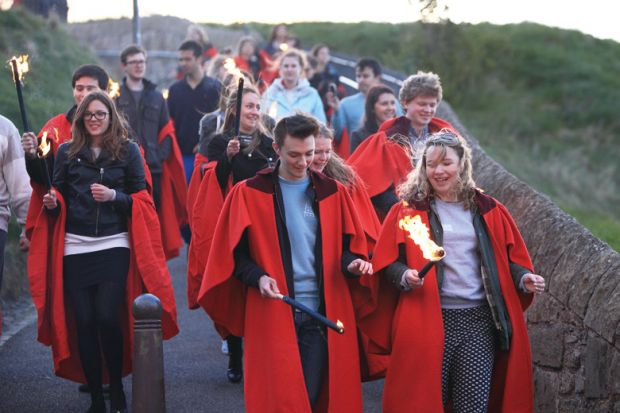It is “not evident” that maintaining free higher education has given Scotland an advantage over the rest of the UK on widening access, a report says.
Research by the University of Edinburgh for the Sutton Trust shows that Scottish 18-year-olds from the most advantaged backgrounds remain four times more likely than those from the least privileged areas to go straight to university. In England, the equivalent figure is 2.4, and it is about three in Wales and Northern Ireland.
The report puts this down to the capping of student numbers in Scotland and contrasts this with the situation in England, where the lifting of number controls and the introduction of £9,000 fees have fuelled significant expansion of the sector. Increased competition for university places has a disproportionately negative effect on students from poorer backgrounds, the report says, because they are less likely to achieve the best school qualifications.
Many Scottish students start their higher education in the college sector, and this is reflected in the country’s better higher education participation rate among under-30s compared with England.
One in five Scots (20.9 per cent) started higher education in a college in 2013-14, with 34.1 per cent going straight to university, while in England only 6 per cent started in college, with 40.6 per cent going straight to university.
About half (47 per cent) of students taking Higher National qualifications in Scottish colleges do progress to university, but the report says that they may struggle to get into a prestigious institution or get a job in the professions.
In particular, only half of those who do transfer receive full credit for their prior learning and are able to leapfrog the start of the university course, with the rest being required to repeat one or more years of study, meaning that it could take five or six years to obtain an honours degree.
The report says that this is particularly concerning because higher education students from deprived areas are becoming more concentrated in colleges. Sixty-one per cent of this group entered higher education via college in 2013, compared with 55 per cent in 2006, meaning that 90 per cent of the overall growth in the participation rate for disadvantaged students has been via this route.
Authors Sheila Riddell, Lucy Hunter Blackburn, Gitit Kadar-Satat and Elisabet Weedon call for a “much more nuanced” discussion of Scottish higher education funding.
If free tuition is retained, they say, it must be accompanied by a stronger focus on access, such as reserved places for disadvantaged students at universities.
“It is not evident from the data that divergence in fee policy has given Scotland any specific advantage compared to other parts of the UK, in relation to increasing overall levels of participation or participation by more disadvantaged groups,” the report says.
“Improvements in participation have been largely driven by the growth of college higher national provision in which students from poorer backgrounds are overrepresented,” it adds.
“This is because the supply of university places in Scotland has not kept pace with rising demand and increased competition for university places, particularly in the most selective universities, has had a disproportionately negative effect on students from the most deprived backgrounds.”
Register to continue
Why register?
- Registration is free and only takes a moment
- Once registered, you can read 3 articles a month
- Sign up for our newsletter
Subscribe
Or subscribe for unlimited access to:
- Unlimited access to news, views, insights & reviews
- Digital editions
- Digital access to THE’s university and college rankings analysis
Already registered or a current subscriber? Login




